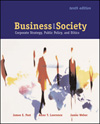 |  Business and Society: Corporate Strategy, Public Policy, Ethics, 10/e James Post,
Boston University
Anne T Lawrence,
San Jose State University
James Weber,
Duquesne University
Antitrust, Mergers, and Global Competition
Chapter Summary- The world's largest corporations are capable of wielding much influence because of the central functions they perform in their respective societies and throughout the world. Corporate power is legitimate when used to affirm broad public purposes, but it may also be abused.
- In the United States, antitrust laws have been used to curb the influence of corporations and to protect consumers, small business competitors, and others affected unfairly by noncompetitive practices.
- Courts and regulators have generally maintained in recent years that monopoly does not in itself constitute a violation of antitrust laws. What is important is whether a company has competed unfairly, hurt consumers, or blocked innovation.
- The 1990s and early 2000s witnessed a fresh wave of mergers and acquisitions. The key causes were technological change, globalization, shifts in the regulatory environment, and the booming stock market. Some believed that these mergers were good for stockholders and other stakeholders; others expressed concern about the long-run effects such mergers would have on both business and society.
- The emergence of global competition in many industries has led business and political leaders to adjust antitrust rules to help the United States better compete in the world economy, for example, by permitting joint R & D efforts where appropriate and by blocking anticompetitive practices by foreign firms.
|
|




 2002 McGraw-Hill Higher Education
2002 McGraw-Hill Higher Education